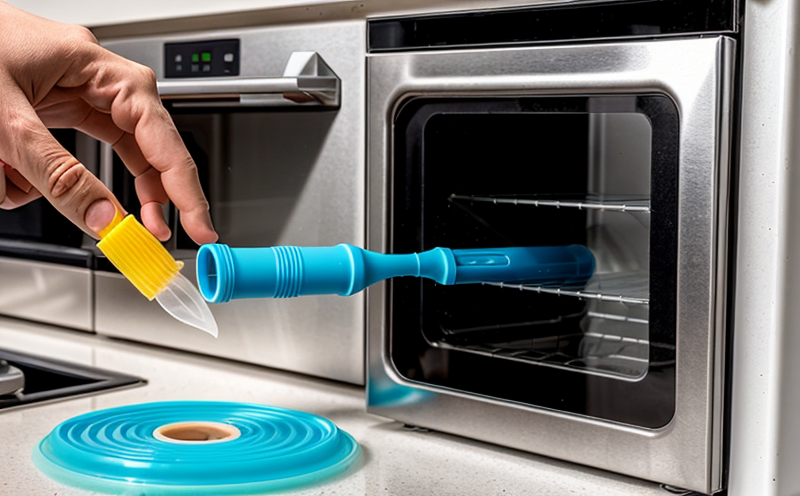ISO 6603 Impact Resistance Testing of Household Plastics
The ISO 6603 standard outlines a method for determining the impact resistance of household plastics. This testing is crucial in ensuring that products meet safety and performance requirements, especially in scenarios where they may be exposed to impacts during normal use or accidental drops.
Impact resistance testing evaluates how well a material withstands energy from an impact without fracturing or breaking. For household plastics, this test is particularly important as many items such as food containers, toys, and electronics housings can experience mechanical stress due to daily handling and usage.
The procedure involves impacting a specimen with a specific type of pendulum hammer at controlled conditions. The energy absorbed by the material during impact is measured using an accelerometer or other suitable devices. The result provides insight into the material's toughness and durability, which are critical factors in product design and safety.
Specimens for ISO 6603 testing can be prepared from various household plastic items like polystyrene foam, polypropylene, and ABS (Acrylonitrile Butadiene Styrene). The choice of specimen type depends on the specific characteristics being evaluated. For instance, foams are tested to assess their resilience under impact, while rigid plastics may focus more on fracture behavior.
The testing apparatus typically includes a pendulum hammer, a support stand, and an impact cushion. The hammer strikes the specimen at a predetermined angle and height, simulating real-world conditions as closely as possible. The impact energy is then measured accurately to ensure precise results.
Once the test is conducted, the data collected is analyzed for compliance with ISO 6603 requirements. Compliance ensures that the tested household plastics meet industry standards in terms of safety and performance. This standardization helps manufacturers produce consistent products that can be trusted by consumers and regulatory bodies alike.
In addition to meeting safety regulations, impact resistance testing also aids in optimizing product design. Engineers can use test results to refine materials and improve structural integrity without compromising on aesthetics or functionality. For example, understanding how different plastics behave under various stress conditions allows for the creation of safer and more durable products.
The importance of this test cannot be overstated, especially given the diverse range of household plastic applications. From kitchenware that needs to withstand frequent drops to children's toys designed for play and exploration, impact resistance is a key factor in product reliability and consumer safety. By adhering to ISO 6603 standards, manufacturers ensure that their products not only meet regulatory requirements but also exceed expectations in terms of quality and longevity.
The implications of this testing extend beyond the manufacturing process. Consumers benefit from safer products that are less likely to break or pose a risk under normal usage conditions. Regulatory bodies can enforce consistent safety measures across industries, contributing to public health and well-being. In summary, ISO 6603 impact resistance testing plays a vital role in enhancing product quality and ensuring consumer satisfaction.
Applied Standards
The primary standard for this type of testing is ISO 6603:1996. This international standard specifies the procedure for determining impact resistance in household plastics. It ensures consistent and reliable results across different laboratories, which is essential for maintaining product quality and safety.
Other relevant standards that can be used alongside ISO 6603 include ASTM D256 ASTM D256, which provides similar testing methods, and EN 14789:2002 EN 14789 for European manufacturers. These standards offer additional insights into impact resistance testing, providing a comprehensive approach to evaluating household plastics.
The use of these international standards ensures that the results obtained are comparable and acceptable worldwide. This consistency is particularly important in an interconnected global market where products may be manufactured or sold across different regions with varying regulatory requirements.
Benefits
Conducting ISO 6603 impact resistance testing offers numerous benefits to manufacturers, quality managers, and compliance officers involved in the production of household plastics. Here are some key advantages:
- Safety Assurance: Ensures that products do not pose a risk to consumers during normal use or accidental drops.
- Regulatory Compliance: Helps manufacturers meet international safety standards, avoiding costly legal issues and product recalls.
- Quality Improvement: Provides valuable data for optimizing material choices and improving product durability.
- Consumer Trust: Builds brand reputation by delivering products known to be safe and reliable.
- R&D Optimization: Offers insights into the behavior of different plastics under impact, aiding in innovation and development of new materials.
- Cost Efficiency: Reduces waste during production by ensuring that only suitable materials are used for specific applications.
The comprehensive nature of ISO 6603 testing ensures that manufacturers can confidently produce household plastics that meet high standards in terms of safety and performance. This, in turn, enhances consumer trust and satisfaction while maintaining competitive advantage through superior product quality.
Why Choose This Test
The ISO 6603 impact resistance test is a critical component for manufacturers involved in the production of household plastics. Here’s why choosing this particular test is essential:
- International Recognition: Being an internationally recognized standard, it ensures that your products meet global safety and performance benchmarks.
- Consistency Across Laboratories: Using a standardized procedure guarantees consistent results regardless of the testing facility, enhancing reliability.
- Compliance with Regulations: Helps in meeting regulatory requirements, thereby avoiding potential legal issues and product recalls.
- Enhanced Product Quality: Provides detailed information about material behavior under impact, aiding in quality control and improvement efforts.
- Customer Confidence: Ensures that products are safe for use in households, boosting consumer confidence and satisfaction.
- Innovation Support: Offers a platform to explore new materials and design concepts, driving innovation within the industry.
The ISO 6603 impact resistance test is not just about meeting compliance requirements; it’s also about setting industry standards. By incorporating this testing into your quality assurance process, you can ensure that your household plastics meet the highest safety and performance standards.





